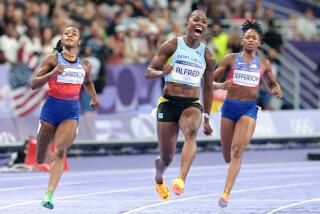Decker Has Bad Trip in the Olympic 3,000
- Share via
Suddenly, the infectious smile was gone, replaced by weeping rage.
The world had awaited the matchup at 3,000 meters between America’s decorated veteran runner, Mary Decker, 26, and South African prodigy Zola Budd, 18, at the Los Angeles Olympics.
But instead of the Great Race everyone had hoped for, it became the Great Fall, one of the most controversial Olympic incidents of the century.
It happened just past the halfway point of the race. Budd, running in her bare feet, had moments before passed Decker for the lead. Decker was about to pass Budd back, but just at that moment, Budd, running in Lane 1, swerved slightly to the left, cutting off Decker, who, in shortening her stride, stumbled and spiked Budd’s left heel.
Their feet tangled for an instant and suddenly Decker was down, in the infield, out of the race, dissolving in tears.
Budd kept running, enduring choruses of boos as she ran around the track. This, after the year she had already endured. She had obtained British citizenship, enabling her to run in the Olympics, circumventing the Olympics’ ban on South Africa.
Anti-apartheid demonstrators had called her “white trash.” A British tabloid had run a headline: “GO HOME”
Finally stressed out beyond her limits, and pained by her bleeding heel, Budd faded badly on the last lap and finished seventh.
An umpire disqualified her shortly after the race, but an appeals jury, after studying tapes, reinstated her.
Lost in the furor was the winner, Romania’s Maricica Puica, who won the race in 8:35.96. Even though Decker had won the 1983 world championships in the 1,500 and 3,000, she was no cinch to beat Puica, who had come to Los Angeles with the world’s best 3,000 time.
But as the 1900s end, she’s still the answer to the Olympic trivia question: Who won the race when Mary Decker fell?
Also on this date: On the same day, in another well remembered 1984 Olympic controversy, U.S. light-heavyweight Evander Holyfield’s disqualification in a semifinal match was upheld. A Yugoslav referee had ruled Holyfield had hit his opponent after his “stop” command. Holyfield was allowed to keep the bronze medal, however. . . . In 1982, Belmont Stakes winner Conquistador Cielo was syndicated for a record $36.4 million. . . . In 1984, with a strong Cuba among the boycotting nations, the U.S. boxing team swept to a record nine gold medals at the Olympics.
More to Read
Go beyond the scoreboard
Get the latest on L.A.'s teams in the daily Sports Report newsletter.
You may occasionally receive promotional content from the Los Angeles Times.






